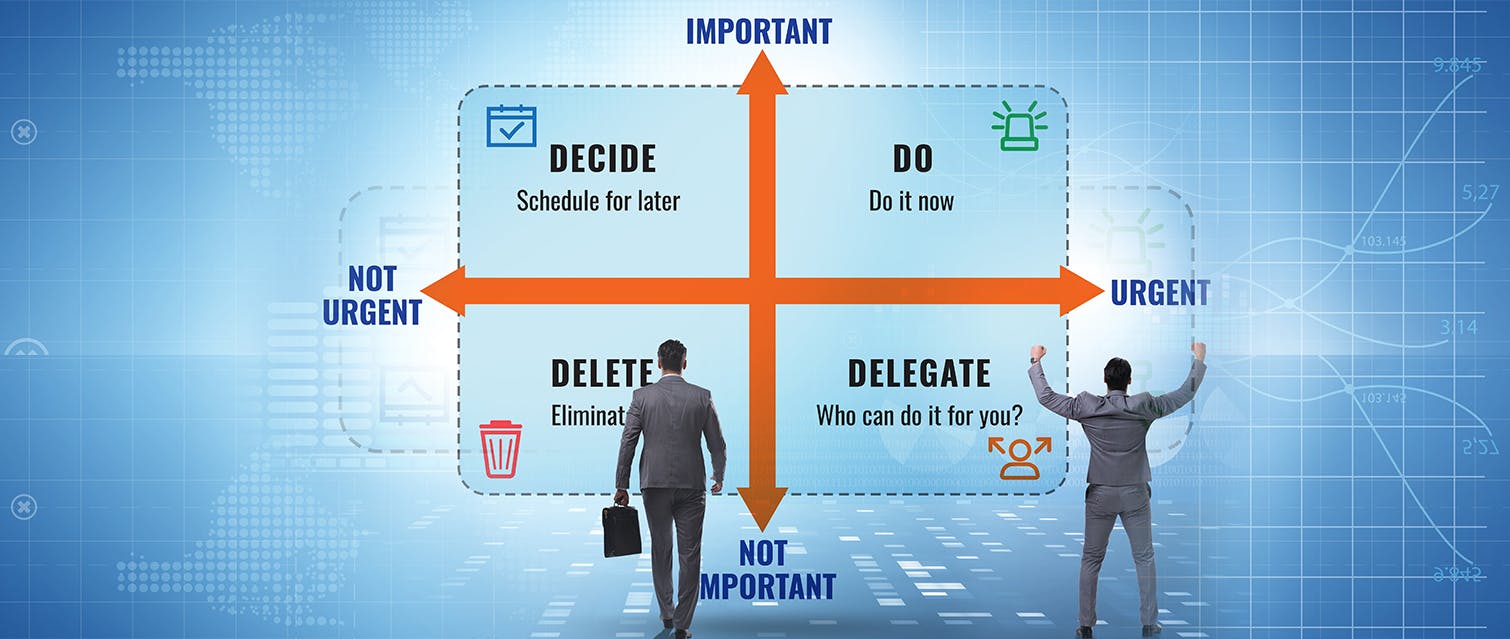Home | Blogs | Effective Time Management With Eisenhower Matrix
Effective Time Management With Eisenhower Matrix
One of the most important factors determining an individual's quality of life is how well they manage their time, both professionally and personally. We have written about the Eisenhower Matrix for you, which was brought to the world of time management literature by former US President Dwight D. Eisenhower.
Dwight D. Eisenhower reigned over the United States for two terms, from 1953 to 1961. He placed a high value on time management. To do this, he developed the Eisenhower Matrix approach, which has been in use for many years. The strategy is guided by Eisenhower's aphorism, "What is important is seldom urgent and what is urgent is seldom important."
This tool assists you in categorizing your tasks into four categories: tasks to be completed first, tasks to be scheduled later, tasks to be delegated, and tasks to be deleted.

How to tell the difference between important and urgent tasks
Even if the terms urgent and important appear to have the same meaning, the Eisenhower principle demonstrates that there is a major difference between the two. Separating urgent actions from important ones in the Eisenhower Matrix will help you decide which duties you should take on right away and which others on your team would be better equipped to handle.
Urgent tasks require your immediate attention. When something is critical, it must be completed immediately, and failure to complete these tasks by the deadline will have evident consequences. You can't avoid these things, and the longer you put them off, the more agitated you'll be, which may lead to burnout.
Even though they do not require your immediate attention, important tasks are nonetheless required for your long-term success. Even if they are less urgent, these responsibilities are nonetheless important. To make the greatest use of your resources, you will need to carefully plan such tasks.
Once you grasp the distinction between important and urgent tasks, you can begin organizing your work into the four quadrants of the Eisenhower Matrix.
If you don't organize your tasks according to your priority, you could run into issues like difficulty focusing on your work or having to handle several projects at once. As a result, you can concentrate on pointless tasks and squander time ineffectively. The four groups of work in the Eisenhower Matrix are as follows:
◦ Do
◦ Schedule
◦ Delegate
◦ Delete

DO
The first quadrant, known as the "do" quadrant, is where you should assign any urgent and important activities. Put anything in this quadrant when it needs to be done right immediately, has evident consequences, and affects your long-term goals.
These are the tasks that are on your mind and likely giving you the most stress, so there should be no debate about which ones go in this quadrant.

SCHEDULE
The second quadrant, known as the "schedule" quadrant, is where you should place any tasks that are important but not urgent. You can schedule these tasks for later completion because they have an impact on your long-term objectives but don't require immediate attention.
These assignments will be taken on immediately following those in quadrant one. You can complete the tasks in this quadrant by using a variety of time management strategies.

DELEGATE
Any jobs that are urgent but not important should go in the third quadrant, which is the "delegate" quadrant. These obligations must be met right now, but they have no bearing on your long-term objectives.
You can assign these tasks to other members of your team as you don't feel personally invested in them and they probably don't require your particular skill set to execute. One of the most effective strategies to manage your workload and provide your team with the chance to grow as a team is to delegate jobs.

DELETE
After you've gone through your to-do list and added items to the first three quadrants, you'll have a few tasks left over. The tasks that remained undone were neither important nor urgent.
These minor, non-urgent distractions only serve to keep you from reaching your goals. Put these last items on your to-do list in the fourth quadrant "delete".
Blog
A journey of 18 years of dedication, passion, and success.





